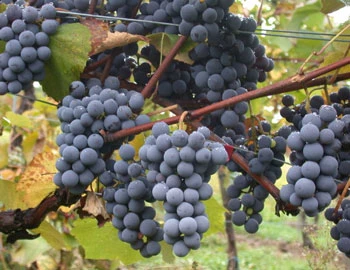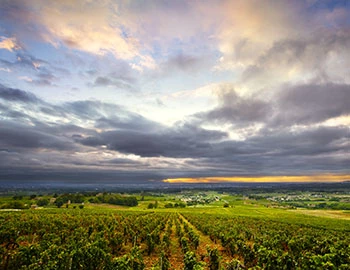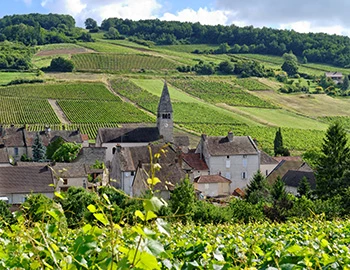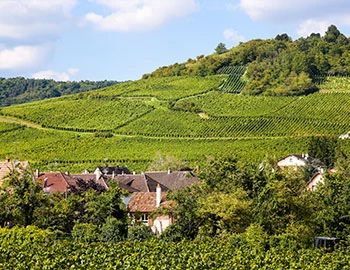
Juliénas Vignes Centenaires 2022
AC, Domaine Laurent Perrachon et Fils, 750 ml

| Grape variety: | Gamay |
| Producer: | Domaine Laurent Perrachon & Fils |
| Origin: | France / Bourgogne / Beaujolais |
Description
The vines for this Juliénas are on average 100 years old and produce a powerful, complex and concentrated wine. Distinctive notes of ripe fruits such as blackcurrants, blackberries, plums and figs form a broad range of aromas with the noble roasted notes of wood development. The tannins are perceptible and accompany the juicy acidity, which gives the wine a powerful structure and good storage potential. With its long, taste-intensive finish, it offers wonderful pleasure.
Attributes
| Origin: | France / Bourgogne / Beaujolais |
| Grape variety: | Gamay |
| Ripening potential: | 2 to 8 years |
| Drinking temperature: | 16 to 18 °C |
| Food Pairing: | Pork fillet with plums, Spiced grillades, Cold fish dish, dried meat, Hearty stew with pulses |
| Vinification: | Punching down, partly destemmed, Pumping over, fining |
| Harvest: | hand-picking, strict selection |
| Maturation: | in large wooden barrel/foudre, in used barriques |
| Maturation duration: | 18 months |
| Volume: | 13.0 % |
| Note: | Contains sulphites |
Gamay
The ideal summer red
The first written mention of the Gamay grape was not particularly flattering. In 1395, Philip the Bold, Duke of Burgundy, wrote that the variety showed a “terrible bitterness” and was “very harmful to human beings”. For this reason, the entire stock was to be pulled within five months. Luckily, it did not come to this. Otherwise, today we would have neither the excellent crus of Beaujolais, produced from this grape, nor the Dole du Valais a marriage of Gamay and Pinot noir. Admittedly, the Beaujolais nouveau, which was clamoured about in the 1980s, is not its best manifestation. But with good maturity and competent grapes, the Gamay shows great charm and a fragrant strawberry, raspberry and cherry fruit, backed by peppery notes. It is the ideal summer red: slightly chilled, it tastes great on the terrace, and is excellent with grilled fish.

Beaujolais
Beaujolais: the lightness of being
Though it always features an alcohol content of between 12.5 and 13.5 percent by volume, Beaujolais, a varietal Gamay, is considered a light wine. With its fruity vibrancy, it is a sociable wine that harmonizes exquisitely with simple and classic cuisine. The southern part, Bas Beaujolais, produces simple, highly drinkable wines, while the crus from the northern Haut Beaujolais – which ripen on weathered granite – demonstrate substantially greater individual expression.

Bourgogne
Burgundy: home of the crus
Burgundy and Bordeaux are France’s most prestigious wine regions. Nonetheless, they are completely distinct in character: while Bordeaux, as the land of the chateaux, enjoys an aristocratic image, Burgundy has retained its rustic agrarian structure. Burgundy stretches for over 200 kilometres, from Dijon in the north to Lyon in the south. In a highly complex jigsaw of the most diverse of terroirs, Chardonnay and Pinot Noir demonstrate the subtle ways in which they embody their sources.

France
France – Philosophy in a bottle
According to French philosophy, wine should be an expression of the soil and climate. They use the word “terroir” to describe this. Terroir makes every wine different, and many especially good. French wine is regarded worldwide as an expression of cultural perfection. The French believe that humans are responsible for the quality of the berries, the vine variety for their character, and nature for the quantity. This philosophy can be expressed succinctly as: “the truth is the vineyard, not the man.”


